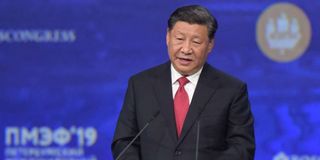China bid to conquer the internet could be Biden’s headache

Chinese President Xi Jinping gives a speech during a plenary session of the St. Petersburg International Economic Forum (SPIEF) in Saint Petersburg on June 7, 2019.
China’s continued investment in undersea cables, especially to developing countries in Africa and the Pacific, could mean a continued headache on the international front for US President Joe Biden, even as he faces the migraine to bring down domestic Covid-19 deaths.
The signs were clear late December and in January after Beijing rejected accusations of “geopolitical espionage” by two Trump-allied Republican senators, Marco Rubio and Ted Cruz.
Zhao Lijian, the spokesperson of the Chinese Foreign ministry argued “it is the United States that has been conducting massive cyber theft all over the world, even on its allies".
"It is a real empire of hacking and theft. The Chinese government encourages domestic companies to conduct investment cooperation overseas based on market principles, international rules and host country laws,” he said in written answers to reporters.
The claims emerged following reports that a subsidiary of Huawei Technologies had successfully fronted a bid to construct a project worth $72.6 million, sponsored by the World Bank and the Asian Development Bank, connecting various Pacific Islands including Kiribati and Micronesia.
This wasn’t the first project by a Chinese company. In September 2018, Huawei laid 6000km of cable from Brazil to the Central African coast, financed by the Export-Import Bank of China, as well as another 12000km of undersea fibre optics cables linking Asia, Africa and Europe, financed by the China Construction Bank.
There are about 350 undersea cables covering about 102,000km and supplying the world with data connectivity. Most of them are owned by US firms Google, Facebook, Amazon and Microsoft, according to one report by broadbandnow.com.
Communist Party
But the Chinese have installed these projects while accused by Washington of having links to the Chinese Communist Party, with which there are fears of sharing private data.
Under Trump, the US classified Huawei as a security risk and banned it from bidding for US government contracts. Washington also agreed to fund a migration for US carriers from Chinese manufactured equipment for new infrastructure.
Trump also threatened to ban Chinese social media giants WeChat and Tiktok, unless a significant shareholding was controlled by Americans.
With fears raised on 5G and other gadgets, it may mean that sub-sea cables could offer the US a new headache. With most of Chinese tech being cheaper than the rest, African countries like Kenya have been heavily investing in infrastructure that will continue to use their technology.
Huawei Marine, the subsidiary of Huawei Technologies has been involved in the construction of about 100 undersea cable projects around the world. But Beijing may have a political goal too.
“The provision of high-tech surveillance gear will link Beijing more closely to autocrats it helps maintain in power,” said Hal Brands in a column in Bloomberg on Monday.
“And China’s growing technological influence will help it line up friendly, or simply dependent, states behind it on issues from internet governance to leadership of key international organisations,” he argued.
Old challenges
That means Biden may face old challenges such as nuclear threats from North Korea or terrorism in Kenya and Somalia. He may want to pursue policies that ensure a safer internet and one free of manipulation especially among allies.
The Chinese tech giants have continuously rejected allegations they were puppets of the Communist Party. Recently though, Beijing passed a new law that may require homegrown firms to disobey foreign legal orders if deemed injurious to Chinese sovereignty.
Known as the ‘Rules on Counteracting Unjustified Extraterritorial Application of Foreign Legislation and Other Measures’, the new laws as meant to “mitigate the impact of foreign legal measures, including economic sanctions and information requests, on Chinese economic and security interests,” according to a statement from the Chinese Ministry of Commerce.
Chinese firms are usually obligated to “assist” Chinese officials with information regarding intelligence.
Will the Chinese knowledge of undersea cables be a risk of say, severance of links in times of conflict? Zhao Lijian said Chinese firms will operate based on international law.
But Trump’s administration often accused Beijing of intruding in private firms. He had banned American entities from using Chinese payment platform Alipay.
The undersea cable, however, is part of a ‘Digital Silk Road’ by Beijing which also includes satellite connections and 5G networks. In January 2019, Trump’s Pentagon had said the submarine cables were useful in connecting the world but could enable the owners to steal information or censor it.
Most of Chinese tech investments are in the developing countries and usually funded by Chinese lenders. Yet Beijing itself has been accused of keeping a tight lid on information flow back home. Officials in China often argue that every car must have breaks, suggesting free access without regulation could be dangerous.
As Biden begins his presidency, he may find himself questioning whether that technology will be trusted.





